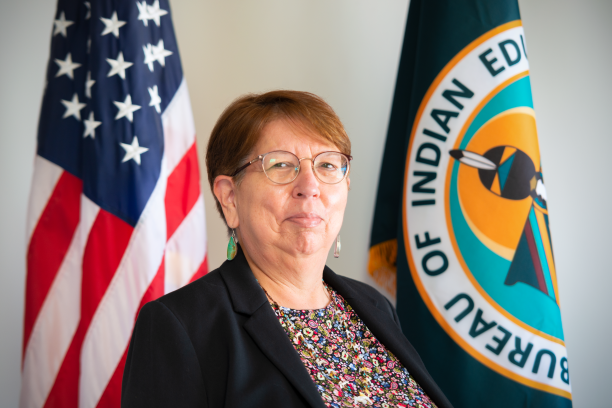
- Details
- By Native News Online Staff
Tamarah Pfeiffer, Ph.D., a tribal citizen of the Navajo Nation, has been appointed as the president of Southwestern Indian Polytechnic Institute (SIPI). SIPI, a public tribal land-grant community college in Albuquerque, New Mexico. is operated by the Bureau of Indian Education (BIE). The community college offers programs ranging from liberal arts to pre-engineering.
“Dr. Pfeiffer has been inspiring Indigenous students for more than 40 years,” Bureau of Indian Education Director Tony L. Dearman said in a statement. “She most recently served as BIE’s chief academic officer and has a phenomenal reputation in Indian education. Her experience will cultivate a college environment that will create culturally diverse learning opportunities for Indigenous students.”
During her career at BIE, Pfeiffer served as acting president at Haskell Indian Nations University, BIE chief academic officer, and associate deputy director for Navajo Schools. Before joining BIE, Pfeiffer held positions at Arizona State University, Penn State, Dine College, and Northern Arizona State University.
“My primary focus will be to build upon the college’s strengths from the perspective of a growth mindset,” Dr. Tamarah Pfeiffer said. “We must prioritize SIPI’s partnerships with surrounding Tribal communities, colleges, and universities, both public and private, so we can seamlessly transition SIPI students to four-year studies. I want to create an environment where SIPI is a springboard for every student to launch into a successful and prosperous career that will contribute back to their communities. To accomplish that, we must thoroughly prepare our students for a four-year degree and a career of highly skilled employment.”
Pfeiffer received a doctorate in educational leadership from Penn State University and a master’s degree in English from Middlebury College’s Bread Loaf School of English. She earned her bachelor’s degree in secondary education with an emphasis on teaching English as a second language from the University of New Mexico.
“The SIPI mission statement entrusts us with the duty of preparing our culturally diverse Native American students as life-long learners through partnerships with Tribes, employers and other organizations,” said Dr. Pfeiffer. “I will work tirelessly to ensure our mission statement becomes a reality for each SIPI student.”
More Stories Like This
Hanging a Red Dress for Christmas: MMIP, Native Higher Education, and Hope for a Better New YearNative Students Can Win $5,000 Scholarship, International Distribution in Pendleton Design Contest
American Indian College Fund Raises Alarm Over Plan to Shift Native Programs Away From the Dept. of Education
MacKenzie Scott Foundation Gives $5 Million Contribution to Little Priest Tribal College
Tribal Leaders Push Back on Dismantling of U.S. Department of Education
Help us defend tribal sovereignty.
At Native News Online, our mission is rooted in telling the stories that strengthen sovereignty and uplift Indigenous voices — not just at year’s end, but every single day.
Because of your generosity last year, we were able to keep our reporters on the ground in tribal communities, at national gatherings and in the halls of Congress — covering the issues that matter most to Indian Country: sovereignty, culture, education, health and economic opportunity.
That support sustained us through a tough year in 2025. Now, as we look to the year ahead, we need your help right now to ensure warrior journalism remains strong — reporting that defends tribal sovereignty, amplifies Native truth, and holds power accountable.
 The stakes couldn't be higher. Your support keeps Native voices heard, Native stories told and Native sovereignty defended.
The stakes couldn't be higher. Your support keeps Native voices heard, Native stories told and Native sovereignty defended.
Stand with Warrior Journalism today.
Levi Rickert (Potawatomi), Editor & Publisher


